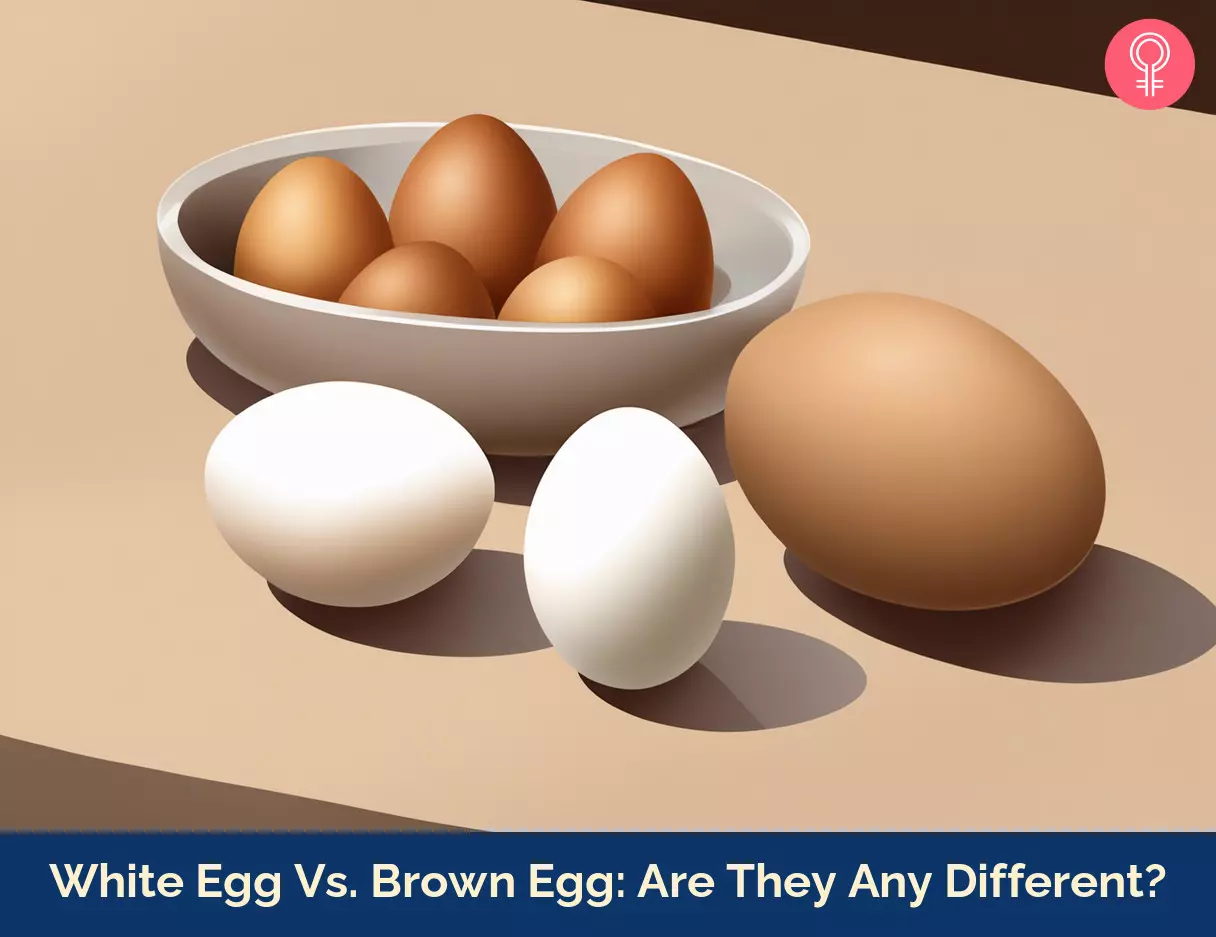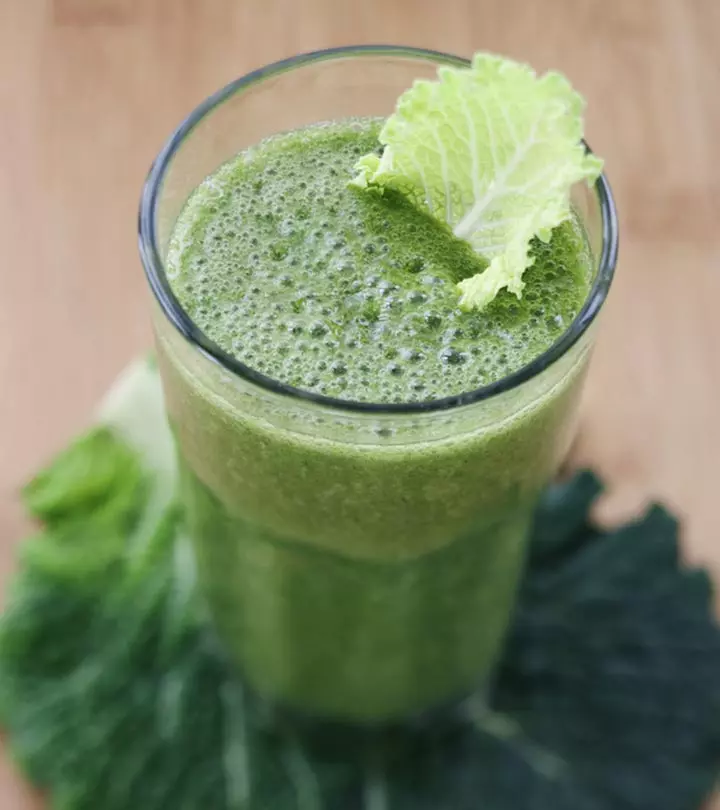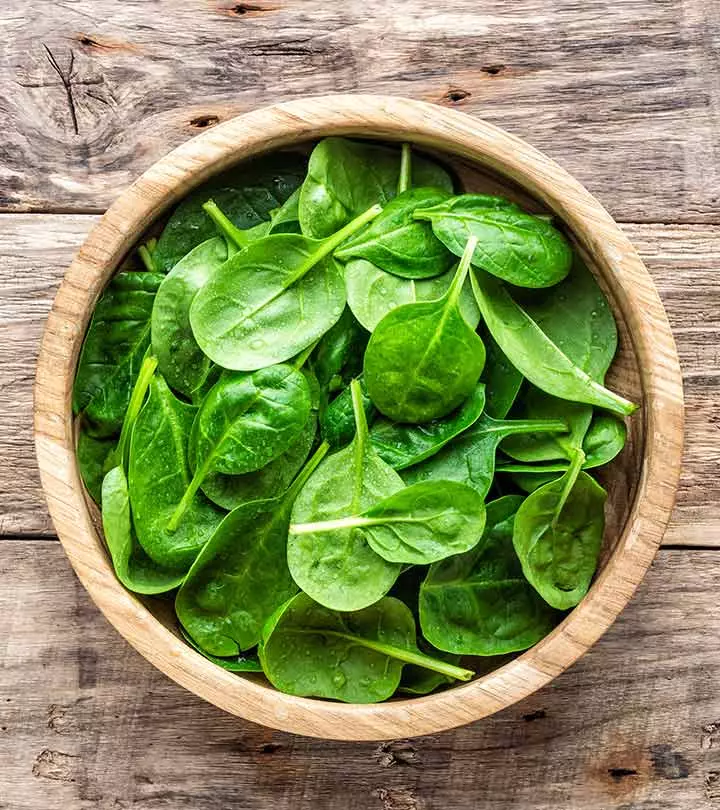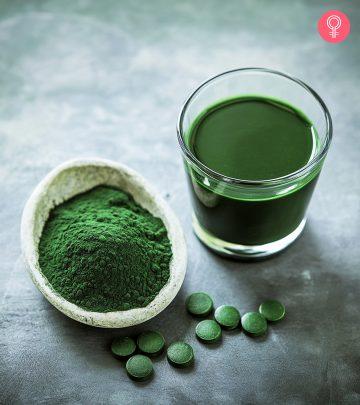Brown Eggs Vs White Eggs: 5 Essential Facts
Learn about the differences between the two to determine which eggs to buy next!

Image: iStock
Do you have a preference when it comes to buying eggs? Do you opt for brown eggs more often assuming that they are healthier? Or do you stick to white eggs because that’s what you have always eaten? In the white egg vs. brown egg battle, there certainly is a difference in the color of the eggshells and sometimes in price, but are the differences just shell-deep? Read on to know all the details and facts you need to know to help you make an informed choice when buying eggs next time.

 Fun Fact
Fun FactIn This Article
Egg Colors Difference

People tend to opt for brown chicken eggs assuming they are the healthier version just like brown bread, brown rice, or brown pasta. However, that’s not true for eggs. The USDA states that the color of the eggs depends on the breed and genetics of the hens (1), (2), (3).
For example, chicken breeds such as the White Leghorn, White Rock, and Cornish lay white eggs, while Plymouth Rocks, Rhode Island Reds, and New Hampshire lay brown-shelled eggs. Few other chicken breeds like the Araucana, Lushi, Dongxiang, and Ameraucana lay blue-green or blue eggs.
A blogger who owns a chicken farm attests to this and writes about how she had been less educated about chickens and their eggs when she started out. “Egg color and size don’t determine the quality. This was a silly misconception I had prior to owning my own chickens. I always thought the brown eggs were the “farm fresh” ones. Truth is, I was very wrong. Egg color and size are determined by the breed of chicken. Many small flock owners pride themselves with an assortment of colors and sizes, ranging from white to deep chocolate brown (even blue, pink, and green!) (i),” she says.
The difference in the non-white color of the eggshells is due to the pigments produced by that particular breed.
- Brown eggshells contain the pigment protoporphyrin IX (4).
- Blue eggshells contain the pigment biliverdin (4), (5).
Sometimes, egg color may vary within the same breed as well, based on their genetic dominance (6).
Apart from the breed and genetics, other factors like the hen’s diet, environment, stress levels, and age may also influence the shell color. While these factors may alter the light or dark shade of the eggs, they do not really change the color of the egg (4).
 Trivia
TriviaKey Takeaways
- Eggs may be brown or white depending on the breed and genetics of the hens or factors like the hen’s diet, stress levels, or environment.
- Usually, both brown and white eggs contain high-quality protein, vital vitamins, and minerals.
- Just like the nutritional content, the color of the shell does not determine the taste of the eggs.
- Brown eggs are more expensive than white eggs as the chicken that lays them requires more feed due to their larger body size.
- Instead of color, you should consider labels like organic or vitamin-enhanced to choose better egg variants.
Are Brown Eggs Healthier Than White Eggs?

Often, people opt for brown eggs believing that brown eggs are more natural and healthier than white eggs. However, that’s not really true. All eggs provide you with similar nutrition irrespective of their eggshell color (1). Research states that the egg composition or quality is not affected by the shell color (7). The color difference is only because of the difference in the pigment in the shell and not the nutritional value. Both brown and white eggs contain high-quality protein, vital vitamins, and minerals (8). There is no significant protein difference between brown and white eggs as many assume.
However, there are a few other factors, like the hen’s environment and its feed, that may affect the egg’s nutritional content.
For instance, free-range hens that are allowed enough sunshine are known to produce eggs with a higher amount of vitamin D than eggs from hens raised conventionally in coops and cages (9).
Also, chickens fed a diet enriched with omega-3 fatty acids or vitamin D produce eggs with higher levels of these nutrients respectively (10), (11).
Since both brown and white eggs offer the same nutrition, you may consume any of them. You can have them poached, fried, boiled, or scrambled. They are also used in baked goods and dishes like quiches, omelets, and frittatas. Let’s further see if the taste and size of brown vs. white eggs differ in any way.
Taste And Size Difference

While some people may believe that brown eggs taste better than white eggs, it’s just a matter of personal preference. Just like the nutritional content, the eggshell color doesn’t really determine the taste of the eggs. However, other factors like the type of feed, the breed of chicken, cooking method, and freshness may affect the taste of the eggs (12).
Most home-raised chickens lay brown eggs and taste slightly richer or have a more vibrant yolk because of their feed. This might lead some people to opine that brown eggs taste better than white eggs.
Eggs develop an off-flavor when stored longer, especially at high temperatures (13). Eggs collected fresh from the backyard don’t go through the extra processing and shipping time and hence seem fresher and tastier than the conventional supermarket ones.
Sometimes, the way an egg is cooked might also affect its flavor. One study found that eggs of hens fed conventional feed vs those fed fish-oil-enriched feed tasted the same when scrambled, but not when boiled. The latter variety had an off-sulfur-like flavor (14).
So, while various factors may affect the egg flavor, shell color is not one of them. However, when it comes to size and weight, research suggests that brown eggs are heavier than white eggs and have more shells, more albumen (egg white), and less yolk (15). So it is ultimately as per your personal preference.
Why Are Brown Eggs More Expensive?

Most often than not, you would find brown eggs cost more than white ones, even though they are the same in all aspects except the color. This might often lead people to believe that brown eggs are higher in quality or nutrition than white ones. However, the difference lies in the fact that chickens that lay brown eggs are larger in body size and require more feed, translating into the higher cost of brown eggs on store shelves. Also, some special types of eggs, such as organic or free-range that often tend to be brown are priced higher as well. That may lead you to be aware of certain other considerations while choosing the kind of eggs you go for.
Other Considerations

Rather than the color, which doesn’t really make a difference in the nutritional value of eggs, there are certainly other factors that might help you select better eggs. You can look for egg labels that certify them as
- Organic – eggs from hens fed on pesticide-free grains and diet
- Omega-3 fortified – eggs from hens that are fed on flaxseeds and fish oil to increase the omega-3 fatty acid content.
- Vitamin-enhanced – eggs from hens fed on a vitamin-rich diet.
- Free-range – eggs from hens that are free to roam around and feed as they like.
- Cage-free – eggs from hens kept indoors, but not in cages.
- Antibiotic-free – eggs from hens not treated with any antibiotics
These eggs make for a better option than the commonly available eggs that come from conventionally raised hens.
Unravel the mystery between brown and white eggs and make an informed choice for your health. Learn about the nutritional benefits of each variety in the insightful video below.
To Sum Up
Eggs come in different colors – brown, white, blue-green depending on the breed and genetics of the chicken. Unlike brown bread, brown rice, or brown pasta, when it comes to brown vs white eggs, there are no additional health benefits or nutritional differences. Brown eggs are neither healthier nor tastier than white eggs. The factors that do make a difference in egg nutrition and flavor primarily include the hen’s diet and environmental conditions. Next time, you are out to get eggs, either get the ones freshly collected from the farm or opt for USDA certified organic, nutrient-enriched, or free-range eggs. To unscramble it for you, when it comes to the white eggs vs. brown eggs battle, the differences are just about the shell color.
Frequently Asked Questions
Do eggs from free-range hens taste different?
Yes, anecdotal claims suggest that eggs from free-range hens taste better than eggs from conventionally farmed hens, as the former are more exercised and have better muscle. However, there is no difference in their protein quality (16).
Can I substitute brown eggs for white eggs?
Yes. Brown and white eggs are nutritionally similar. They also have similar yolk consistency and do not differ in taste.
Why are there no white eggs in the UK?
It is difficult to find white eggs in the UK as most British hen breeds produce brown eggs. Brown eggs were historically preferred as they were considered to be healthier than their white counterparts. However, many Indian egg recipes for dinner use both white and brown eggs.
Do eggs have to be refrigerated?
Yes. In the US, fresh eggs have to be refrigerated to prevent the growth of salmonella bacteria or reduce the chances of food infection.
Do white eggs have more cholesterol than brown eggs?
No. Both eggs have a similar nutritional value and have no significant differences in their cholesterol content.
Can I eat eggs every day?
Yes, you can safely consume 1-2 eggs per day. Eggs are a good source of protein and help boost muscle growth.
Is brown egg good for hair?
Yes. Anecdotal evidence suggests that the nutrients present in eggs, including brown eggs, may help boost a healthy scalp and hair. These include proteins, vitamins, and other beneficial compounds.
Should eggs float or sink?
Generally, a fresh egg sinks, while an old egg floats. As eggs age, their small air pockets expand as water is released and replaced by air, causing them to float.
Which eggs are best for baking?
Either one can be used for baking. They are nutritionally similar and have similar properties.
Illustration: White Egg Vs. Brown Egg: Are They Any Different?

Image: Stable Diffusion/StyleCraze Design Team
Personal Experience: Source
StyleCraze's articles are interwoven with authentic personal narratives that provide depth and resonance to our content. Below are the sources of the personal accounts referenced in this article.
i. Care about your health? Maybe my chickens can help you out.https://cluckyinkentucky.wordpress.com/2017/04/28/care-about-your-health-maybe-my-chickens-can-help-you-out/
References
Articles on StyleCraze are backed by verified information from peer-reviewed and academic research papers, reputed organizations, research institutions, and medical associations to ensure accuracy and relevance. Read our editorial policy to learn more.
- Shell Eggs from Farm to Table | Food Safety and Inspection Service
https://www.fsis.usda.gov/food-safety/safe-food-handling-and-preparation/eggs/shell-eggs-farm-table#27 - Recent advances in avian egg science: A review
https://www.sciencedirect.com/science/article/pii/S0032579119315895?via%3Dihub - An EAV-HP insertion in 5’ Flanking region of SLCO1B3 causes blue eggshell in the chicken
https://www.ncbi.nlm.nih.gov/pubmed/23359636 - Eggshell color in brown-egg laying hens – a review
https://www.ncbi.nlm.nih.gov/pubmed/26240390 - A study on eggshell pigmentation: biliverdin in blue-shelled chickens
https://www.ncbi.nlm.nih.gov/pubmed/16553287 - Genetic evaluation of eggshell color based on additive and dominance models in laying hens
https://www.ncbi.nlm.nih.gov/pmc/articles/PMC7322644/ - Physical quality and composition of retail shell eggs
https://www.ncbi.nlm.nih.gov/pubmed/20181877 - Eggs, Grade A, Large, egg whole
https://fdc.nal.usda.gov/fdc-app.html#/food-details/748967/nutrients - Free-range farming: a natural alternative to produce vitamin D-enriched eggs
https://www.ncbi.nlm.nih.gov/pubmed/24607306 - Comparative omega-3 fatty acid enrichment of egg yolks from first-cycle laying hens fed flaxseed oil or ground flaxseed
https://www.ncbi.nlm.nih.gov/pubmed/28108729 - Effects of vitamin D(3) -enriched diet on egg yolk vitamin D(3) content and yolk quality
https://www.ncbi.nlm.nih.gov/pubmed/23331294 - Analyses of free amino acid and taste sensor traits in egg albumen and yolk revealed potential of value-added eggs in chickens
https://onlinelibrary.wiley.com/doi/epdf/10.1111/asj.13510 - Egg handling and storage
https://pubmed.ncbi.nlm.nih.gov/9037701/ - Fatty acid profile and sensory characteristics of table eggs from laying hens fed diets containing microencapsulated fish oil – ScienceDirect
http://www.sciencedirect.com/science/article/pii/S0377840110000192 - The effect of storage and strain of hen on egg quality – ScienceDirect
https://www.sciencedirect.com/science/article/pii/S0032579119416611 - The chemical composition of free-range and conventionally-farmed eggs available to Canadians in rural Nova Scotia
https://pmc.ncbi.nlm.nih.gov/articles/PMC8103914/
Read full bio of Tracy Tredoux
Read full bio of Varsha Patnaik
Read full bio of Ravi Teja Tadimalla
Read full bio of Payal Karnik



























Community Experiences
Join the conversation and become a part of our empowering community! Share your stories, experiences, and insights to connect with other beauty, lifestyle, and health enthusiasts.